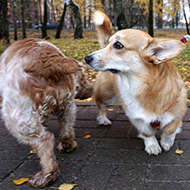Male dogs more likely to develop contagious oro-nasal cancer

"We think it's important to consider CTVT as a possible diagnosis for oro-nasal tumours in dogs" - Dr Andrea Strakova.
Male dogs are four to five times more likely to develop a contagious cancer on their nose and mouth than female dogs, a study from the University of Cambridge has found.
Canine Transmissible Venereal Tumour (CTVT) is spread when dogs come into contact. An infectious cancer, the living cancer cells are able to transplant from one dog into another.
CTVT affects the genitalia of dogs most commonly, and is often transmitted during mating, however, the cancer can also affect a dog's nose, mouth and skin. The oro-nasal form of CTVT is transmitted through the sniffing or licking dogs' genitalia.
Dr Andrea Strakova, first author of the paper, explained: “We found that a very significant proportion of the nose or mouth tumours of canine transmissible cancer were in male dogs.
“We think this is because male dogs may have a preference for sniffing or licking the female genitalia, compared to vice versa.
“The female genital tumours may also be more accessible for sniffing and licking, compared to the male genital tumours.”
In the study, researchers reviewed a database of almost 2,000 CTVT cases worldwide, finding that only 32 cases affected the nose and mouth. Of these cases, 27 were male dogs.
Dr Strakova discussed the importance of veterinary surgeons being aware of oro-nasal CTVT:
“Although canine transmissible cancer can be diagnosed and treated fairly easily, veterinarians in the UK may not be familiar with the signs of the disease because it is very rare here.
“We think it’s important to consider CTVT as a possible diagnosis for oro-nasal tumours in dogs. Treatment is very effective, using single agent Vincristine chemotherapy, and the vast majority of dogs recover.”
Signs of the oro-nasal form of CTVT include sneezing, snoring, difficulty breathing, nasal deformation or bloody or other discharge from the nose or mouth.
Published in Veterinary Record, 'Sex disparity in oronasal presentations of canine transmissible venereal tumour' is available to read here.



 The RCVS has announced a new version of its 1CPD mobile app, with enhanced features for veterinary surgeons and veterinary nurses to record their continuing professional development.
The RCVS has announced a new version of its 1CPD mobile app, with enhanced features for veterinary surgeons and veterinary nurses to record their continuing professional development.